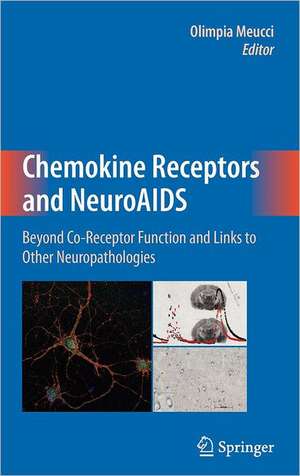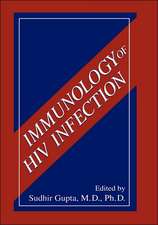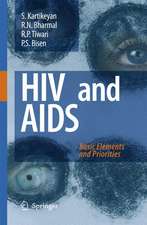Chemokine Receptors and NeuroAIDS: Beyond Co-Receptor Function and Links to Other Neuropathologies
Editat de Olimpia Meuccien Limba Engleză Hardback – 24 dec 2009
To this end, specific topics have been selected and are reviewed by international experts within the basic science/medical community. This book encourages investigation in the most controversial areas and fosters interaction between clinicians and basic scientists. The book also increases awareness about differences in disease progression among different parts of the world as well as selected patient populations, which may also help identifying novel therapeutic strategies.
| Toate formatele și edițiile | Preț | Express |
|---|---|---|
| Paperback (1) | 703.38 lei 6-8 săpt. | |
| Springer – 28 noi 2014 | 703.38 lei 6-8 săpt. | |
| Hardback (1) | 794.73 lei 38-44 zile | |
| Springer – 24 dec 2009 | 794.73 lei 38-44 zile |
Preț: 794.73 lei
Preț vechi: 1032.12 lei
-23% Nou
Puncte Express: 1192
Preț estimativ în valută:
152.09€ • 158.20$ • 125.56£
152.09€ • 158.20$ • 125.56£
Carte tipărită la comandă
Livrare economică 10-16 aprilie
Preluare comenzi: 021 569.72.76
Specificații
ISBN-13: 9781441907929
ISBN-10: 1441907920
Pagini: 430
Ilustrații: XVI, 412 p.
Dimensiuni: 155 x 235 x 31 mm
Greutate: 0.75 kg
Ediția:2010
Editura: Springer
Colecția Springer
Locul publicării:New York, NY, United States
ISBN-10: 1441907920
Pagini: 430
Ilustrații: XVI, 412 p.
Dimensiuni: 155 x 235 x 31 mm
Greutate: 0.75 kg
Ediția:2010
Editura: Springer
Colecția Springer
Locul publicării:New York, NY, United States
Public țintă
Professional/practitionerCuprins
Section I.- HIV Neuroinvasion: Early Events, Late Manifestations.- HIV Co-receptors: The Brain Perspective.- HIV Infection and the PNS.- HIV Latency and Reactivation: Role in Neuropathogenesis.- HIV Coreceptors and Their Roles in Leukocyte Trafficking During Neuroinflammatory Diseases.- Section II.- Chemokine Proteolytic Processing in HIV Infection: Neurotoxic and Neuroimmune Consequences.- Chemokines and Chemokine Receptors in the Brain.- Chemokine Signaling in the Nervous System and Its Role in Development and Neuropathology.- Modulation of Neuronal Cell Cycle Proteins by Chemokine Receptors and Its Role in the Survival of Postmitotic Neurons.- Chemokines and Primary Brain Tumors.- Chemokines as Neuromodulators: Regulation of Glutamatergic Transmission by CXCR4-Mediated Glutamate Release From Astrocytes.- Role of CX3CL1 in Synaptic Activity and Neuroprotection.- Section III.- Interaction Between Opioid and Chemokine Receptors in Immune Cells: Implications for HIV Infection.- Chronic Morphine’s Role on Innate Immunity, Bacterial Susceptibility and Implications in Wound Healing.- Opioids, Astroglial Chemokines, Microglial Reactivity, and Neuronal Injury in HIV-1 Encephalitis.- Regulation of Neuronal Chemokine Receptor CXCR4 by ?-Opioid Agonists and Its Involvement in NeuroAIDS.
Notă biografică
About the Editor:
Olimpia Meucci, MD, PhD is a Professor of Pharmacology and Physiology & Microbiology and Immunology at Drexel University College of Medicine in Philadelphia, PA. Since her seminal discovery about the regulation of neuronal signaling by chemokines, her research has primarily focused on the physio-pathological roles of this important class of neuroimmune modulators in the central nervous system and their involvement in neuroAIDS. These studies have significantly contributed to current understanding of the cellular and molecular mechanisms of HIV-related neuropathology including the interaction of the chemokine system with drug of abuse, namely opiates, which continues to be a major area of investigation in the Meucci lab.
Olimpia Meucci, MD, PhD is a Professor of Pharmacology and Physiology & Microbiology and Immunology at Drexel University College of Medicine in Philadelphia, PA. Since her seminal discovery about the regulation of neuronal signaling by chemokines, her research has primarily focused on the physio-pathological roles of this important class of neuroimmune modulators in the central nervous system and their involvement in neuroAIDS. These studies have significantly contributed to current understanding of the cellular and molecular mechanisms of HIV-related neuropathology including the interaction of the chemokine system with drug of abuse, namely opiates, which continues to be a major area of investigation in the Meucci lab.
Textul de pe ultima copertă
Chemokines and their receptors are being recognized as an integral component of the nervous system implicated in fundamental aspects of development and homeostasis, such as neurotransmission, proliferation, differentiation, and neuronal-glial communication. Thus, their involvement in HIV neuropathology goes far beyond the co-receptors role and entails complex interactions of the chemokine system with different cell types and other regulators of neuronal function. The major goal of this volume is to review these topics in order to highlight alterations of chemokine physiology that may contribute to neuroAIDS and other neuropathologies.
This book will be of interest to neuroscientists, neurologists, virologists, pharmacologists, and students in these fields.
About the Editor:
Olimpia Meucci, MD, PhD is a Professor of Pharmacology and Physiology & Microbiology and Immunology at Drexel University College of Medicine in Philadelphia, PA. Since her seminal discovery about the regulation of neuronal signaling by chemokines, her research has primarily focused on the physio-pathological roles of this important class of neuroimmune modulators in the central nervous system and their involvement in neuroAIDS. These studies have significantly contributed to current understanding of the cellular and molecular mechanisms of HIV-related neuropathology including the interaction of the chemokine system with drug of abuse, namely opiates, which continues to be a major area of investigation in the Meucci lab.
This book will be of interest to neuroscientists, neurologists, virologists, pharmacologists, and students in these fields.
About the Editor:
Olimpia Meucci, MD, PhD is a Professor of Pharmacology and Physiology & Microbiology and Immunology at Drexel University College of Medicine in Philadelphia, PA. Since her seminal discovery about the regulation of neuronal signaling by chemokines, her research has primarily focused on the physio-pathological roles of this important class of neuroimmune modulators in the central nervous system and their involvement in neuroAIDS. These studies have significantly contributed to current understanding of the cellular and molecular mechanisms of HIV-related neuropathology including the interaction of the chemokine system with drug of abuse, namely opiates, which continues to be a major area of investigation in the Meucci lab.
Caracteristici
Contains contributions by leading international researchers Encourages collaboration by basic scientists and clinicians Of interest to those involved in drug development Includes supplementary material: sn.pub/extras

















